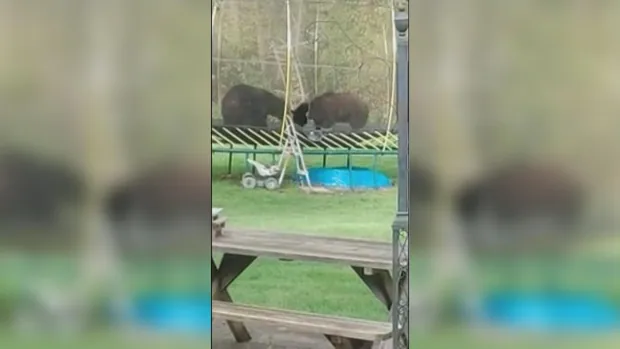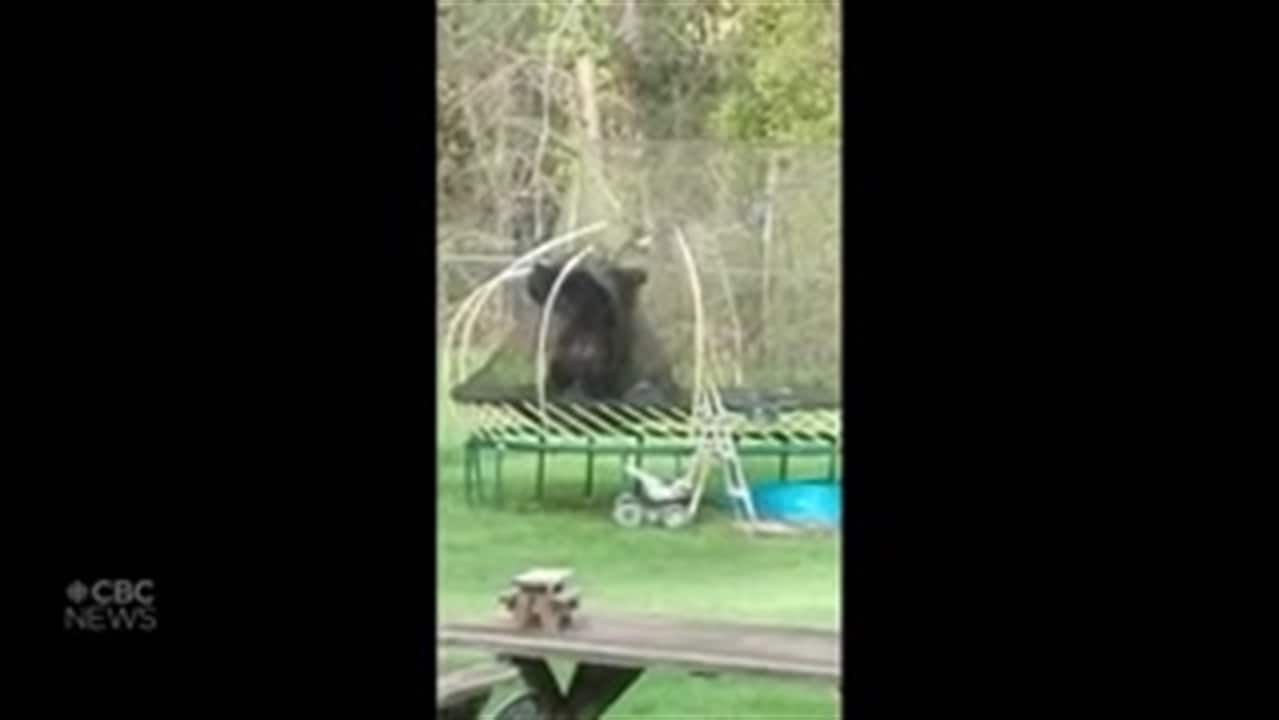A video of two black bears wrestling on a backyard trampoline in Coquitlam, B.C., has prompted a wildlife expert to advise caution as the animals emerge from hibernation and often move closer to humans.
The video, taken last Sunday by Coquitlam resident Rose Waldron, shows a no-holds-barred cage match between two young bears, doing their best professional wrestler impersonations as they duke it out on her trampoline.
Doug Waldron, Rose’s husband, says bears regularly visit the family’s backyard, which is located near a lake close to the Coquitlam River.
“That’s their bathing spot and their fishing hole. It’s their country,” he said. “They can come and go as they please. They don’t bother anybody.”
WATCH | The backyard ursine wrestling match in Coquitlam:
Coquitlam resident Rose Waldron had a front row seat as two young bears had a bout in her yard. (Credit: Rose Waldron/Spotbug Press) 1:31
Waldron says bear visits have become so regular this spring that he leaves the gate open so any wandering bears don’t jump over his fences.
“We’ve been sitting around a picnic table, having coffee or whatever on an afternoon, and a mother and her cubs will come into the yard,” he said.
“They’ll notice we’re there and they’ll just turn around and they’ll leave.”
Despite the considerable back-and-forth of the wrestling contest, Waldron says most of the trampoline is undamaged — with both the netting and trampoline platform unaffected by the bears’ sharp claws.
The fibreglass rods that hold up the trampoline netting, however, cracked under the bears’ weight, with Waldron ruefully saying he’ll have to replace them.
“It’s good enough for somebody [weighing] 150 pounds or less, I’m sure,” he said, laughing. “But having 800 pounds of bear on your trampoline didn’t help things.”
Safety advice for bears
Experts say human-bear encounters are expected in the weeks ahead as the animals begin to move around looking for food after a winter’s sleep.
Vanessa Isnardy, program manager for awareness group WildSafeBC, says people should try not to approach bears that wander near their homes.
“We do encourage people, when they’re taking videos, do it so that the bears aren’t aware of your presence,” she told CBC News.
“We don’t want bears to become too comfortable or habituated around people. That leads to a lot of problems.”
It’s no joke. <br>Every year, hundreds of black bears are killed because of associating people and their activities with sources of non-natural food sources. <br>Bears that learn to forage for non-natural food sources are more likely to get into conflict with people. <a href=”https://t.co/1VOOK47VmR”>pic.twitter.com/1VOOK47VmR</a>
—@wildsafebc
Isnardy says it is important that wild bears do not eat human food, but instead rely on natural food sources.
“Bears are omnivores. They will eat a large variety of things if they can get some calories out of it,” she said. “If you have your leftover spaghetti that went bad in your garbage, they might go after that.”
Isnardy says people should try to secure their garbage bins so bears can’t get at them, preferably in their garage if they have access to one.
“You always want to make sure that your yard is tidy, that there’s nothing that can entangle an animal,” she said. “It’s really important as a responsible person that if you have a bird feeder up, you really keep it inaccessible to your non-target species.”
Isnardy says yard owners should consider taking down their bird feeders for spring as bears start wandering, and check their local bylaws to see if they can install electric fences to dissuade them from entering their yard.
She thinks the Waldrons were visited by one-year-old black bears who will eventually leave their mothers this year and make their way in the world.
As bears are soon emerging from their dens, now is the time to ensure that your garbage is secure. WildSafeBC has several tips to address keeping bears out of your waste: <br>- Store garbage indoors whenever possible <br>- Freeze smelly items until the day of collection or transport <a href=”https://t.co/fJrwPxIxlh”>pic.twitter.com/fJrwPxIxlh</a>
—@wildsafebc
“Bears tend to want to avoid people. They want to avoid our human activities,” she said. “But when we have young bears that grow up in an urban environment … They start losing that natural wariness of people.
“It’s really important that everybody discourages bears from hanging out in their backyards and their communities, [and] encourage them to move on into all natural places where it’s safer for them.”






















Discussion about this post